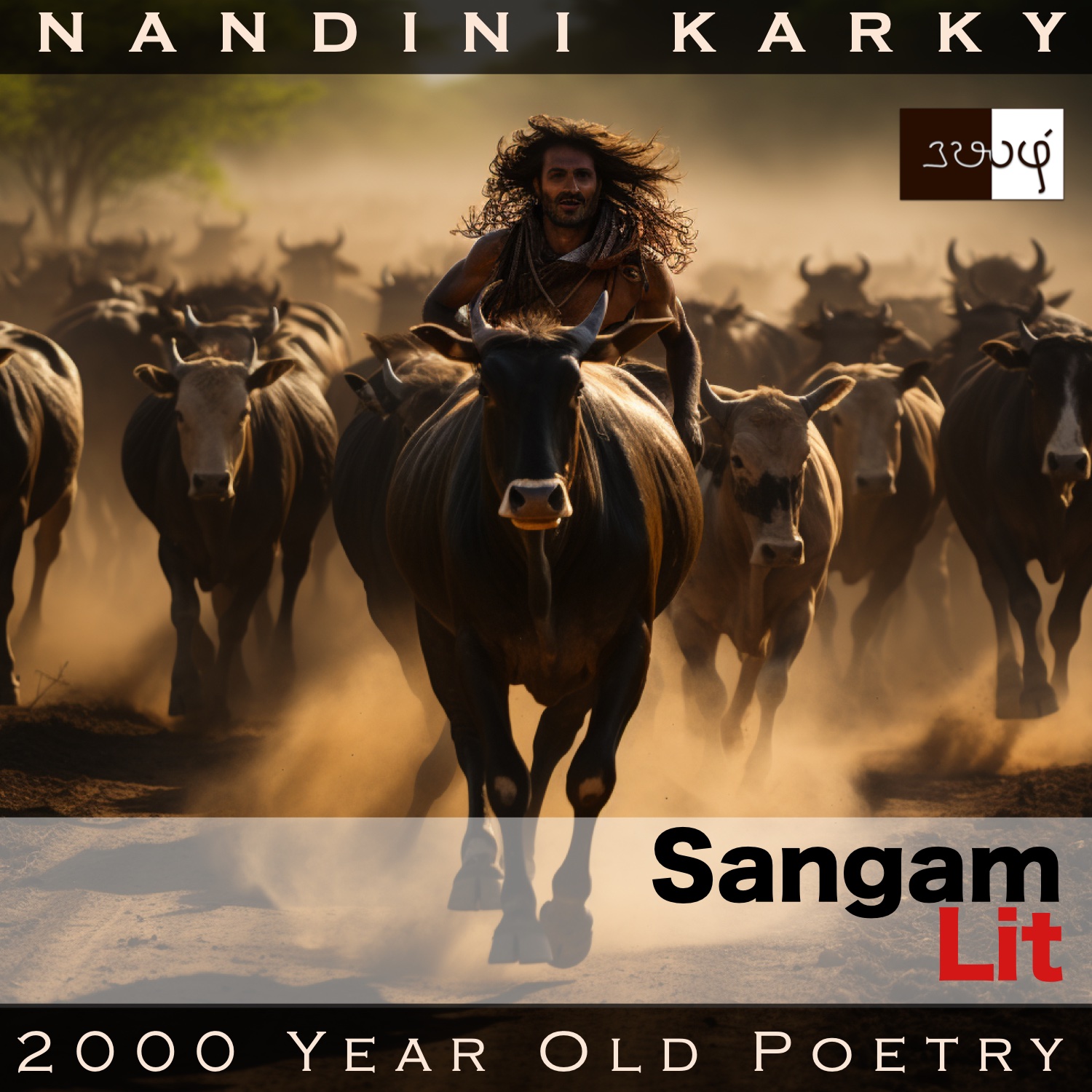Podcast: Play in new window | Download
Subscribe: Apple Podcasts | Spotify | Amazon Music | Android | iHeartRadio | TuneIn | RSS | More
In this episode, we meet with a unique character, as depicted in Sangam Literary work, Puranaanooru 258, penned by the poet Ulochanaar. Set in the category of ‘Vetchi Thinai’ or ‘Cattle Capturing’, the verse informs about the activities and preferences of a particular person.

முள் கால் காரை முது பழன் ஏய்ப்பத்
தெறிப்ப விளைந்த தீம் கந்தாரம்
நிறுத்த ஆயம் தலைச்சென்று உண்டு,
பச்சூன் தின்று பைந் நிணம் பெருத்த
எச்சில் ஈர்ங் கை வில்புறம் திமிரி,
புலம் புக்கனனே, புல் அணல் காளை;
ஒரு முறை உண்ணாஅளவை, பெரு நிரை
ஊர்ப் புறம் நிறையத் தருகுவன்; யார்க்கும்
தொடுதல் ஓம்புமதி, முது கள் சாடி;
ஆ தரக் கழுமிய துகளன்,
காய்தலும் உண்டு, அக் கள் வெய்யோனே.
Continuing in the theme of capturing cattle from enemies to prove their supremacy, the verse delves into the details of a quirky personality. The poet’s words can be translated as follows:
“Akin to the mature fruit from the ‘kaarai’ bush with thorny stems, tastes the aged, sweet ‘Kanthaaram’ toddy. He bartered the cattle he captured for this toddy and then ate raw meat. He then wiped his wet hands coated with the remains of that fresh, fleshy fat, on his bow, and immediately turned back -The bull-like young man with a small beard; Even before you finish your next meal, he will return to town with a huge cattle herd. Don’t let anyone touch that jar of aged toddy. He would be dusty because of the cattle capture and thirsty too -That lover of liquor!”
Let’s explore the nuances here. The poet introduces a leader renowned for capturing cattle from his enemies by relating an anecdote about him. This man was returning with a huge herd of cattle and on the way, he meets a toddy seller, selling such sweet and exquisite liquor, well-aged, tasting like the fruit of a thorny bush called as ‘honey-thorn’. So, this man immediately gives away that entire herd with him to buy that seller’s ware. He tops off his drink by eating raw meat as well. The poet continues by saying the man doesn’t waste any time going in search of a stream to wash his hands, filled with meat and flesh, but instead simply wipes it on the strings of his bow and makes a U-turn. Now that he has given away all his cows for a drink of toddy, the man is off on another cattle-capturing venture, the poet implies. Proceeding from that story, the poet transitions to the present and declares that the man is sure to return with a huge herd even before the village people finish their meal. When he does, he’s going to be covered in dust and filled with thirst after that adventure. So, please make sure no one touches that jar of toddy and save it just for this man, the poet instructs and concludes.
Perhaps the poet did not intend it that way but this verse sure did tickle my funny bone. If you think about it, the core thought here is: He is a chap who’ll sell everything for a glass of liquor, and so, mind you keep that wine jar ready for him when he returns! When we say someone loves his drink, in the current age, we say it with subtle disapproval, whereas here, this young man is being indirectly praised for that same act of loving his drink. Curious how time seems to play a huge role in the equation of human behaviour and the perception of what’s great and what’s not!




Share your thoughts...